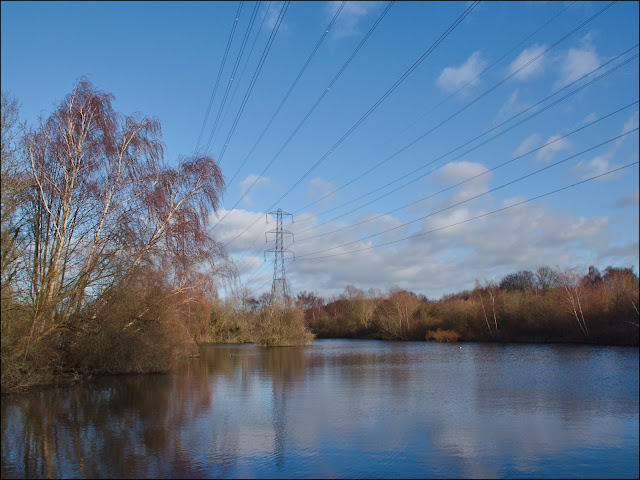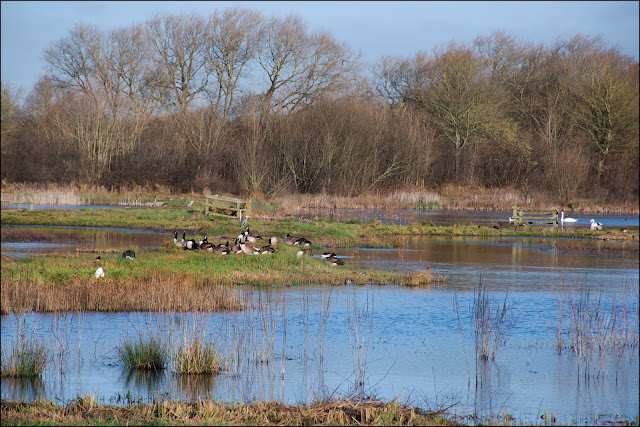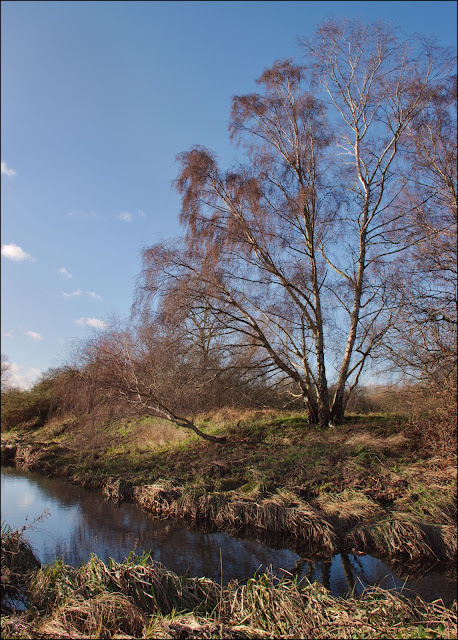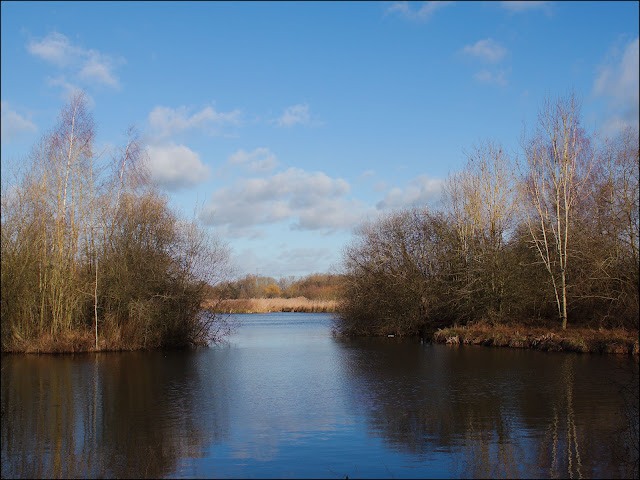Where to go when you want to escape the mud of this English winter but still want to get out on a walk and see some wildlife? I know the very place.
The Lea Valley on the edge of North London may not seem to most obvious place for a country walk, but at least it has many miles of gravel and tarmac footpaths, though you'll have to put up with the occasional eyesore.
It also has a modern "wildlife discovery centre", with a viewing tower and a bird hide (it all looks a lot more comfortable from inside than from without). And, believe it or not, most winters that rarest and most elusive of birds, the Bittern, takes up residence in the scruffy patch of reeds right outside the windows. Knowing it is there however is an entirely different thing to actually seeing it!
No matter. We can still enjoy this rather attractive piece of art as we make our way along beside the Horsemill Stream. Over the years the Lea Valley has been used for all kinds of human endeavour. The watercourses provided power for early mills and factories, the soil is suitable for market gardening and it once had the largest expanse of glasshouses to be found anywhere in the world.
The valley has always provided a transport corridor with railways, a major road and the River Lee Navigation running through it. There were many large pits dug to extract sand and gravel. A whole host of industries came here and several are still active, mostly electronics and consumer goods. Then there came warehouses and what used to be known as transport but now has to be called "logistics". And of course there's an electricity sub-station and its army of unsightly pylons.
Nowadays large parts of it are given over to nature and recreation of all kinds. Apart from walkers, cyclists, anglers, boaters and those who just like to get outside, there are also facilities for many kinds of sports - even an Olympic Park at the southern end of the river!
...while Mallards can be found paddling around throughout the year. I know they may be common, but you'd have to go a long way to find two handsomer fellows.
The whole area is threaded with a confusing tangle of water channels, large and small, all with their own particular beauty. We saw surprisingly few people as we made our circuit of the park, considering how many tens of thousands live within just a few miles - I suspect it's an entirely different story during summer.
A wealth of golden catkins (for one of my regular readers who always enjoys seeing them). The low winter sun illuminating them from behind gave them an added glow.
A Cormorant watched us as we came near to the end of our morning's stroll - a pleasant mix of natural history, human history, winter sun, conversation and of course hot chocolate. (We never did see that Bittern though).













That last scene is a piece of heaven but even the transmission lines on a sunny day don’t hurt the scenery. The birds add to the tranquility. Yeah for the sun!
ReplyDeleteWish we had some.
Finding a paved walkway is indeed good when the grounds are waterlogged, John. We have stayed away from walking in our nearby park for the same reason. Unfortunately, it will still be awhile before the drying out happens. Hopefully, the swans can get out of the locks easily enough. Mallards are quite a handsome species.
ReplyDeleteHi John - I can imagine it must be a blessing to live nearby if you enjoy getting out and about in all weathers, perhaps avoiding the summer crowds. Interesting to see it from your perspective - love the catkins ... while hot chocolate - rather good at the end of in the middle of a damp, wet walk - cheers Hilary
ReplyDeleteI felt as though I was doing that walk with you (from the comfort of my armchair) and those catkins were an absolute joy to behold - thank you John for the post - delightful -
ReplyDeleteWhat a lovely wetland with dry walking! Good to visit there in this season too!
ReplyDeleteThose are lovely photos, John. It is supposed to be quite chilly here today so I may have to do my "hike" at the indoor shopping mall! Not so scenic as your hike! :)
ReplyDeleteGlad to know that nature is able to reclaim when man has plundered. Looks to be a great example of reclamation. How were the temperatures when you walked? And who bring the hot cocoa each time or do you take turns? Have a good weekend.
ReplyDeleteIt was supposed to be about 6 C yesterday, but a chill wind made it seem colder at times.
Deletejoli parcours au sec ! cela ressemble aux gravières aux oiseaux qui longent la Loire ici avec le canal avec un peu moins d'oiseaux * merci pour cette promenade
ReplyDeleteI used to take my granddaughter there (or part of it) in her pushchair when they lived in London. It's amazing and not a little unexpected if you don't know the area.
ReplyDeleteSometimes I find wildlife in the most developed of places. I've seen bitterns at one of my local nature parks - fascinating birds!
ReplyDeleteSuch a beautiful walk, John. It surprised me to read the names of the birds you see there and how many of them are here too... so very far away. If we're lucky we see the bittern here sometimes, but they really do like to hide.
ReplyDeleteThank you so much. Not seeing the bittern this trip means that you will HAVE to go back - which is not a bad thing at all.
ReplyDeleteAnother good walk that you took us along on. I really like that mosaic piece.
ReplyDeleteIt's nice to know that places like this are near to London for people to enjoy
ReplyDeleteAt least it hasn't all been destroyed by the Olympic park.... supposedly built on derelict land. Not only did that get built on a good road cycling race circuit, it wiped out the largest and most diverse ( in plants and people) allotment gardens site in Britain
ReplyDeleteWhat a nice place to walk and explore. Thanks, John.
ReplyDeleteIs it what is called 'edgeland', the modern terminology for it at the present time. It does show how nature is capable of living with humankind. A lovely walk.
ReplyDeleteSuch a tranquil lake to visit and enjoy. The chilling vibe is showing in all photos
ReplyDeleteGood that some of the land is being rehabilitated to somehat of a natural state.
ReplyDeleteThe photo of the catkins is stunning! So enjoy your sharing your walks with us. Have a safe & pleasant weekend.
ReplyDeleteYou wonder what swans think of a Canal lock
ReplyDeleteI clearly can see The Vikings sliding up here❤️Beautiful country💕🌿
ReplyDeleteWhat a wonderful place to walk, mud or no mud. You might have the occasional eyesores, but what a wealth of birds.
ReplyDeleteEven though you say it is not the prettiest walk, you sure did take some lovely photos. the birds in flight looked great. Glad you could get out and about.
ReplyDeleteWonderful photos, as always, John. My favorites today are the mallards and cat kins.
ReplyDeleteCon tal de hacer unas buenas fotos, como estas, yo me pondría unas buenas botas y no vacilaba en caminar por ahí.
ReplyDeleteFeliz domingo.
It is a few years since i walked along the Lea Valley. Your photos are a good reminder of how attractive it is in the main with just one or two places that were a bit of an eyesore.
ReplyDeleteIt seems like a nice place to explore. Peaceful and beautiful!
ReplyDeleteMuddy as can be here too, John. Freeze and thaw, freeze and thaw. Yuck. Your walk looks so nice, the last photo is my favorite I think.
ReplyDeleteAlways great pictures and comments. I love your walks!
ReplyDeleteCertainly different John and you didn't get your boots dirty.
ReplyDeleteNice to have wild-ish places like that near big cities. Even nicer when you have them practically to yourselves!
ReplyDeleteIt looks a very nice place to walk.
ReplyDeleteI enjoyed seeing your photographs.
All the best Jan
Oh what a beautiful place to go on a walk!I think you had a great day!
ReplyDeleteLooks like a lovely walk. I struggle to find walks without mud. I hope this isn't a silly question, would the swans be able to fly out of the canal if there was a danger of them getting stuck?
ReplyDeleteI doubt that they could; they always seem to need a long take-off. However the lock gates are usually open at one end or the other.
DeleteI've only once seen a bittern, though I've heard their distinctive voices a few times. The observed one moved its head at just the right moment or I would have continued to regard it as a tall stem of marsh grass.
ReplyDelete